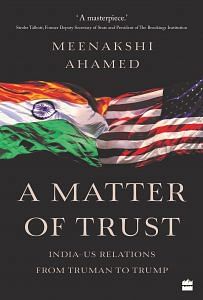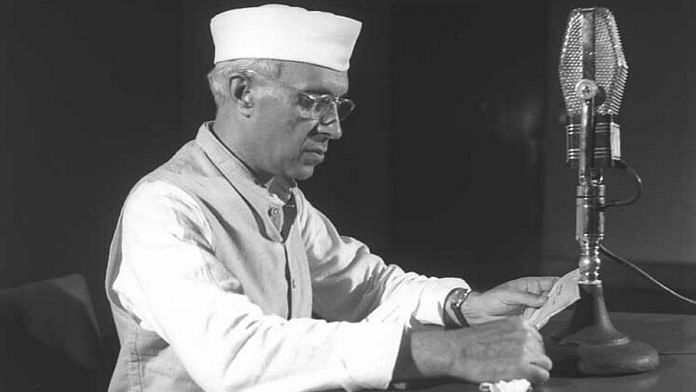In the lead-up to the Second World War, India had tried to negotiate with the British to win independence in return for providing manpower during the war. Hoping to enlist American help, Nehru had written to President Franklin D. Roosevelt about India’s aspirations to be freed from colonial rule and requested his support, assuring him that the Indians would do their best not to submit to the Japanese, who were then threatening India’s eastern border during the war.
Roosevelt tried to persuade Churchill to accept the forces of history and grant India its freedom, but his advice fell on deaf ears. Churchill was an unapologetic imperialist. When Gandhi launched his campaign of non-violent resistance to British rule, Churchill was apoplectic and ‘raged that Gandhi ought to be lain bound hand and foot at the gates of Delhi, and then trampled on by an enormous elephant with the new viceroy seated on his back’.
Churchill had long been an obstinate opponent of Indian independence. He famously said: ‘I have not become the king’s first minister to preside over the liquidation of the British Empire.’ With few strategic interests in India, Roosevelt was unwilling to push Churchill further and invoke his displeasure.
The United States was the most powerful country and FDR the most powerful politician in the world. FDR was elected an unprecedented four times as president. He had grown up in the sophisticated environs of elite east coast institutions and was related to former president Theodore Roosevelt. His record is all the more remarkable as he was struck by infantile paralysis (polio) at the age of thirty-nine and suffered considerable degeneration in his legs. His towering personality and agile intellect more than compensated for his physical disability. Having guided the country through the difficult years of the Great Depression that followed the crash of 1929, and then steered it through the Second World War, he was admired abroad as well as at home.
Also read: India-US relations survived World War & Cold War. They may not survive Trump
President Wilson’s fourteen points, which formed the basis of the US position at the Paris Peace Conference in 1918 and supported self-determination for all people, inspired Indian leaders. The documents had laid the foundations for the League of Nations and subsequently the United Nations, which came into existence in 1942. Nehru’s expectations of US support for Indian independence was further reinforced by the declaration of the Atlantic Charter in 1941. But the British viewed the freedoms afforded by the document as applicable primarily to Europe. The US saw it differently. According to the historian H.W. Brands, ‘the failure of Americans to contradict Churchill’s narrow construction of the Atlantic Charter provoked considerable dismay’ among Indian leaders.
There were several US officials, such as Wallace Murray at the State Department, who felt the British policy in India was misguided. Although it had no sympathy for colonialism, the US found itself in an awkward position as it was a British ally. Under Secretary Wells worried that with a war raging, Europe was its priority, and although India’s struggle for independence was worthy, Roosevelt’s decision had to ‘turn on the “question of expediency”’. It is a misconception to conclude that the US did little to help India’s nationalist aspirations. ‘Robert E. Sherwood’s Roosevelt and Hopkins (1950) makes it clear that at this time Roosevelt urged Churchill to settle the India question.’18 According to Arthur Herman, ‘Like any alliance, the “special relationship” between Britain and the United States, and the bond between Roosevelt and Churchill, had its shaky moments, almost all of them came over India.’
Close to 2,50,000 US soldiers were stationed in India along the China– Burma–India border. They had come at the behest of the British government to assist in the war effort. In March 1942, Roosevelt had decided to send his personal friend and confidant, Colonel Louis Johnson, to India as an ‘observer’. Indian nationalists conveyed to him that they would support the allies during the war but, in turn, they wanted independence from colonial rule.
Louis Johnson’s presence in India made the British uncomfortable. He got along well with Nehru and made friends with many of the leaders of the independence movement, who naturally hoped that the US would support their aspirations, having fought its own independence from the British. Tensions over Johnson’s presence reached a head when the British dispatched Sir Stafford Cripps to India in March 1942 to try to work out an arrangement with the nationalists to assist the war effort in return for a gradual timetable for independence.
Also read: World is back to being bipolar but India may be on its own
According to Henry William Brands, ‘Roosevelt directed Louis Johnson … to mediate between Cripps and Viceroy Linlithgow on the one hand and Nehru and the Congress party on the other. The appearance of Johnson as a deus ex machina threw a momentary scare into the British.’ Cripps was a liberal and sympathetic to India, but the proposal that Johnson came up with exceeded his instructions from Churchill. The mediation failed as soon as Churchill gained assurances from Washington that they would not seek to use the Cripps Mission as leverage in the Lend-Lease agreement.
The British had become paranoid about any friendship between India and the US. They were looking for people to blame for inciting the nationalists who wanted the British to leave India. In the end, the British left because it was inevitable. ‘The choice, then, was coercion on a large scale or independence—and British resources were inadequate to retain power by force.’
The warm rapport between Johnson and Nehru was aborted when a severe intestinal infection compelled Johnson to leave India suddenly. It was a condition that would afflict several US ambassadors subsequently stationed in India, including Galbraith and Moynihan. The British were relieved as they viewed any relationship between India and the US, particularly with Indian leaders involved in the freedom struggle, as a threat to their status quo.
The failure of the US to influence Churchill left the Indians somewhat bitter. Many leaders of the independence movement felt disappointed by the country that claimed to uphold the very aspirations of freedom, liberty and equality that India was trying to attain. Louis Johnson’s warmth and friendship had raised false hopes among the freedom fighters who had convinced themselves that America would support their cause once Johnston spoke to his president. When Louis Johnson left, there was no one to counter the subtle anti-US messaging that was being fed to Nehru and other leaders in the Congress party by the departing British. The British, in their anxiety to preserve their status in India, were prepared to sabotage any potential relationship from developing between the US and India. Jagat Mehta, who was in the foreign service and got to know Nehru, believes that this was when Nehru first became disillusioned with the US.
 This excerpt from Meenakshi Ahamed’s book ‘A Matter Of Trust: India-US Relations From Truman To Trump’ has been published with permission from HarperCollins India.
This excerpt from Meenakshi Ahamed’s book ‘A Matter Of Trust: India-US Relations From Truman To Trump’ has been published with permission from HarperCollins India.




It is necessary to write objectively, not to slander and then to provoke civil wars in the world, as is the custom in the USA. You have lost the basic journalistic honor as is customary in the USA. Be true to your tradition India. After the arrival of the USA in India in the last centuries, they freely stole Pakistan, no freedom came, but the worst period of India With violent, unrecorded migration. USA propaganda based on provoking war in a country against each other, after which they benefit from that country is known. Read more Indian texts, there you will learn about strategies and procedures to conquer the country.
India must never forget how the thieving British exploited India for 200 years and then tried to forcibly keep India as part of their evil empire. It’s a pity that India supported Britain during WW2, as the British killed 3 million Indians due to the Bengal Famine. We should keep in mind the criminal nature of the British, and let their weak, island nation continue to sink due to their foolish decision of Brexit. Let their thieving country burn into ashes just like the Nazi empire burned down.